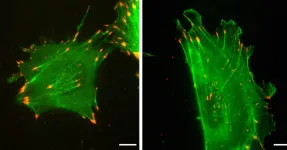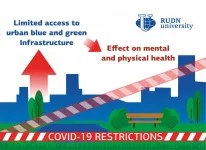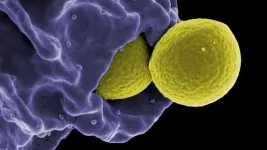(Press-News.org) Mandatory covid-19 vaccination for care home workers is unnecessary, disproportionate and misguided, warn experts
And is based on unreliable data
In The BMJ today, experts argue that mandatory vaccination is "unnecessary, disproportionate, and misguided."
The government decision to remove the right of care home staff in England to choose whether or not to be vaccinated against covid-19 is a profound departure from public health norms. The intended next step is a rapid and massive expansion of compulsory vaccination to legally require covid-19 and flu vaccination of all frontline health and social care workers, subject to consultation.
But Lydia Hayes, Professor of Law at Kent University and Allyson Pollock, Professor of public health at Newcastle University, say vaccination "is not a panacea for safety" and "will not remedy the serious shortcomings of the care sector in England."
They note government consultation documents and subsequent media reports have claimed that mandatory vaccination is necessary because of low vaccination take up rates in some care homes.
But figures show that by 20 June 2021, over 90% of care home residents in England had received two doses of a covid-19 vaccine, 84% of care workers in England had received a first dose, and 72% of care workers had received a second dose - in line with Scientific Advisory Group recommendations.
Their closer scrutiny of the data shows that uptake of the first dose of covid-19 vaccination among care workers is below 80% (68-74%) in only three English local authorities but these numbers are an artefact of very low numbers of staff employed by care homes in these London areas.
Moreover, they highlight that the government's own methodology note warns that reliable information on vaccination uptake cannot be directly derived from the data the government is using.
According to regulatory law, safety in care homes "is achieved through adequate staffing levels, training, equipment, cleanliness, personal protective equipment, risk assessment, and consultation with staff and residents," they write.
Vaccination protects individuals from covid-19 and reduces the risk of transmission of disease to others, but neither duration of protection nor efficacy against new variants are known.
Wales and Scotland have rejected compulsory vaccination for care workers and invested in systems of mandatory registration for care workers designed to professionalise the sector, increase access to training, and embed a culture of continuous professional development, they add.
But in England, successive ministers have rejected national care worker registration. "Hence, the Department of Health and Social Care and the CQC don't know who England's care workers are and training of the care workforce is woefully inadequate."
"Civil liberty is a necessary component of strong public health. Mandatory vaccination is unnecessary, disproportionate and misguided, they warn. "Safety can be assured only by taking steps to build trust and to mitigate outbreaks."
"Care workers need paid time in which to access vaccination and good training, decent wages (including sick pay), personal protective equipment, and strong infection control measures," they conclude.
INFORMATION:
Externally peer reviewed? No
Evidence type: Editorial; Opinion
Subjects: Care home workers
An estimated 8.4 billion people could be at risk from malaria and dengue by the end of the century if emissions keep rising at current levels, according to a new study published in The Lancet Planetary Health.
The research team estimates that this worst-case scenario would mean the population at risk of the diseases might increase by up to 4.7 additional billion people (relative to the period 1970-1999), particularly in lowlands and urban areas, if temperatures rise by about 3.7°C 1 by 2100 compared to pre-industrial levels.
The study was led by the London School of Hygiene & Tropical Medicine (LSHTM) with partners from Umeå University, Sweden; Abdus Salam ...
LOS ANGELES - A new prognostic tool developed by researchers from the UCLA Jonsson Comprehensive Cancer Center and five other institutions helps predict which men with advanced metastatic prostate cancer will respond favorably to a novel targeted therapy.
The tool, described in a study published today in Lancet Oncology, analyzes a wide spectrum of imaging and clinical data and is intended to assist physicians considering treating patients with Lutetium-177 prostate-specific membrane antigen, or LuPSMA.
LuPSMA, which binds to PSMA proteins and delivers targeted radiation to prostate cancer tissue, offers a new option to men with PSMA-positive metastatic cancer that is castration-resistant, meaning it has stopped ...
The protein actin is ubiquitous and essential for life. In mammals, every cell expresses two of its forms, beta-actin and gamma-nonmuscle-actin. Despite having distinct roles, the two forms are nearly identical, sharing 99% of their amino acid sequence.
Research by Anna Kashina of Penn's School of Veterinary Medicine and colleagues has shown that, contrary to scientific dogma, it's not the slight differences in amino acid sequence that govern these proteins' discrete functions in the cell. Rather, their nucleotide sequences--the "letters" that make up their DNA coding sequence, which differ by roughly 13% between the two forms--are responsible for their individual roles in organisms' ...
Researchers have produced vaccine-like immune responses to a dangerous bacterium by colonizing 26 healthy volunteers with a related, but harmless, commensal bacterial species. The first-in-human, controlled infection study showed the strategy was safe, as no side effects were reported and the volunteers didn't transmit the commensal bacteria to bedroom-sharers over the 90-day study. Neisseria lactamica is a member of the microbiome that usually resides in the upper airways of children but can also safely colonize the airways of adults. Some researchers theorize that these bacteria ...
By 2050, faster adoption of electric vehicles (EVs) and faster generation of renewable energy will result in 99% less fossil fuel consumed and 93% less CO2 emissions from passenger and freight vehicles on O?ahu. That's under the most ambitious scenario in an article published in World Electric Vehicle Journal, by University of Hawai?i at Mānoa School of Ocean and Earth Science and Technology (SOEST) faculty member Katherine McKenzie.
McKenzie, based at the Hawai?i Natural Energy Institute in SOEST, created mathematical models of four scenarios based on projections for the switch to electric passenger and freight ...
Five years ago, researchers at Northwestern University made international headlines when they discovered that human eggs, when fertilized by sperm, release billions of zinc ions, dubbed "zinc sparks."
Now, Northwestern has teamed up with the U.S. Department of Energy's (DOE) Argonne National Laboratory and Michigan State University (MSU) to reveal that these same sparks fly from highly specialized metal-loaded compartments at the egg surface when frog eggs are fertilized. This means that the early chemistry of conception has evolutionary roots going back at least 300 million years, to the last common ancestor between frogs and people.
"This work may help inform our understanding of the interplay of dietary zinc status and human fertility." -- Thomas O'Halloran, professor, Michigan State ...
The measures taken during the COVID-19 pandemic limited the access of citizens to natural objects. It is still unexplored, what consequences this had for the residents and what conclusions should be drawn for more effective urban planning. RUDN University scientists with colleagues from Australia and Germany studied how the restrictions associated with COVID-19 affected the use of blue and green infrastructure by citizens in Moscow (Russia) and Perth (Australia), and what consequences this had for their health. In the article "Human Dimensions of Urban Blue and Green Infrastructure during a Pandemic. The Case Study of Moscow (Russia) ...
Bahamian mosquitofish in habitats fragmented by human activity are more willing to explore their environment, more stressed by change and have smaller brain regions associated with fear response than mosquitofish from unaffected habitats. The new study from North Carolina State University shows that these fish have adapted quickly in specific ways to human-driven change, and cautions that environmental restoration projects should understand these changes so as not to damage adapted populations.
The Bahamas mosquitofish is a small, coastal fish species that frequently inhabits tidal creeks - shallow, tidally influenced marine ecosystems. ...
In 2019, Anaïs Llorens and Athina Tzovara -- one a current, the other a former University of California, Berkeley, postdoctoral scholar at the Helen Wills Neuroscience Institute (HWNI) -- were attending a scientific meeting and pleased that one session, on gender bias in academia, attracted nearly a full house. The problem: The audience of some 300 was almost all women.
Where were the men, they wondered? More than 75% of all tenured faculty in Ph.D. programs around the world are men, making their participation key to solving the problem of gender bias, which negatively impacts the careers, work-life balance and mental health of all women in science, and even more ...
FOR IMMEDIATE RELEASE
In what turned out to be one of the most important accidents of all time, Scottish bacteriologist Alexander Fleming returned to his laboratory after a vacation in 1928 to find a clear zone surrounding a piece of mold that had infiltrated a petri dish full of Staphylococcus aureus (S. aureus), a common skin bacterium he was growing.
That region of no bacterial growth was the unplanned birth of a medical miracle, penicillin, and would lead to the era of antibiotics. Now, END ...




